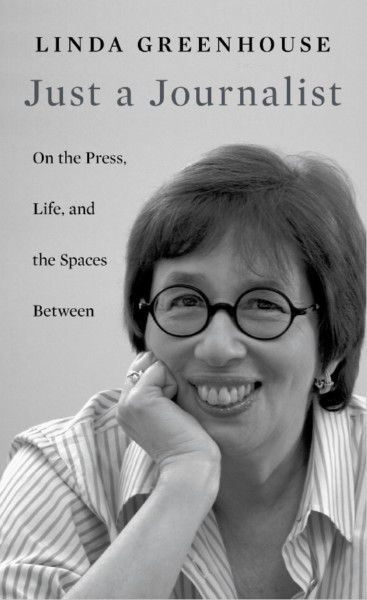Sign up for the daily CJR newsletter.
Linda Greenhouse occasionally stepped into controversy as The New York Times’s Pulitzer Prize-winning Supreme Court reporter. In 1989, her participation in a march for reproductive rights—as a citizen, not a journalist—provoked criticism. So, too, did her 2006 remarks to a group of Radcliffe alumnae complaining about the Bush administration’s attempts to exempt detainees at Guantánamo Bay from judicial oversight. Now Greenhouse, the Joseph Goldstein Lecturer in Law at Yale Law School and a contributing op-ed writer for the Times, is free to stoke whatever controversy she wants. Her new book, Just a Journalist, is “not a memoir,” she says, but “a personal reflection” on the challenges journalism is facing. CJR talked with her by phone, and what follows is a condensed, edited version of the conversation.
The book is based on lectures that you gave at Harvard in November 2015. But since then you’ve had to revise it to deal with the phenomenon of Trump coverage.
That ended up driving the project. When I started writing, the 2016 election was barely in view, and Donald Trump wasn’t plausible. So when I first gave the lectures, I don’t think I really paid any attention to him. Then, as events unfolded, I realized that the mainstream media’s coverage of would-be candidate and then nominee Trump really crystallized some of the themes that I had been exploring and made those themes more urgent.
ICYMI: Explosive BuzzFeed scoop raises eyebrows
You say you train “an autobiographical lens on the practice of journalism.” What do you think the value is of that approach, and the pitfalls?
The value is it brings theory down to practice. The pitfall is that it’s one very partial view, one person’s experiences. In part my project is to engender robust conversation and debate about the practice of journalism in the maelstrom that it currently finds itself in.
One thing I try to say in the book is that for too long the norms that had developed—the “he said, she said,” the “two sides to every story” type of norm—simply weren’t seriously challenged. It didn’t take me to challenge [them] because the very existence of Donald Trump would have brought the challenge to the fore.
How have you evolved on the issue of journalistic objectivity? When you were starting out, did you embrace it as a goal?
I guess that’s right. What’s the purpose of daily journalism? I think the purpose is to enable an informed citizenry to have at hand the facts they need to decide how they wish to be governed and to live in society. I think I always thought that the obligation was to sort out facts from rhetorical assertions. So when I was covering politics in New York, if the governor of New York had said the moon is made of green cheese, I’m sure I would have quoted him, and I would have said, “By the way, it isn’t.” And I wouldn’t have thought of that as a lack of objectivity—I would have thought of it as the essence of separating fact from fiction.

Just a Journalist: On the Press, Life, and the Spaces Between. Harvard University Press, 192 pages, $22.95.
There’s this other mantra—of fairness and balance—because objectivity has been under siege for a long time. Is that more helpful?
I think fairness resides in giving everybody you’re covering a shot, letting them say what they want to say. Obviously you wouldn’t refuse to quote somebody.
But you might. In the spectrum of opinions, some opinions aren’t really considered acceptable. There might be cases where you might not want to quote an avowed white supremacist, for example.
Well, I guess, maybe. My sense always was it wasn’t my job to tell readers what to think, but to give them the facts so they could come to their own informed conclusion.
Do you think there’s such a thing as objectivity, whether it’s desirable or not? It seems as though the stories that newspapers choose to cover, the questions that are asked, will always embody biases.
Yes, it’s a very reductive concept because we’re all human; we’re filtering everything we see through our own minds and our own experiences. You get a big debate on just a standard inverse pyramid lead. What’s the most important thing? Sometimes it’s obvious, and sometimes it’s a matter of judgment.
What role did the rise of digital journalism play in undermining the idea of objectivity?
In the old days, when I was first in the Washington bureau, the ethos was they didn’t want you to go on television: “Don’t undermine the brand. You embody The New York Times, and this low-level medium wants to exploit the fact that you are a New York Times reporter to aggrandize themselves.”
ICYMI: The story the NYTimes, BuzzFeed didn’t want to publish
And now it’s gone in the other direction.
It’s amazing—the irony is how much that has flipped. I’ve been gone [from the Times] almost 10 years. I really hardly know anybody there anymore. But my impression is that people are urged to extend the brand into other media—instead of being bad for the paper, it’s good for the paper. Now it’s at a point where [the question is] exactly how far should this go….I read the [recent New York Times] memo saying there are some limits to what you can say on Twitter. I don’t know—I’m not on any of these social media. I have no personal experience.
You’re not on Twitter at all?
I’m not at all. I know that’s shocking.
Or Facebook?
No, I’m really not. I feel like I spend most of my waking hours on the Web and on email—I’m not a technophobe, but I just haven’t felt the need to do social media.
It’s clear that mainstream news organizations are really struggling with where to draw the line between what is permitted and what is prohibited.
I think journalists should be judged by their work, and not by what they do in their private life.
There are two separate issues, though. One is how far you can go in terms of calling out perceived falsehoods or biases within the work. And then the other is how much of a civic life you’re allowed to have.
They are [separate]. I think, say, someone covering the Supreme Court who might take a pretty dim view of the direction of the court probably shouldn’t go on Twitter and denounce the Chief Justice. There’s a certain amount of common sense. I don’t really have a sense of how crazy that [social media] world might be.
I think it is powered by opinion.
Sure. I think we’re in a whole process of norm creation. It’s behavior that’s far outstripping theory. The behavior is really driving the creation of norms.
The extreme avatar of the other point of view is [former Washington Post executive editor] Len Downie. He’s well known for not voting. But you quote him as saying he gave up having private opinions about anything. That seems impossible.
Well, it surprised me. I’ve never met Len Downie or had an occasion to discuss this with him. But I found that surprising, and I guess he was kind of proud of that accomplishment.
It’s emulated. He’s spawned imitators.
I truly don’t get that. It can come from one of two motivations, it seems to me. One could be, “Oh my gosh, I have so little self-control that if I actually voted for one candidate over another, who knows, I might somehow tilt my coverage in one direction to validate the choice that I made.” That’s one theory. The other would be, not so much out of fear of oneself, but fear of others: “Oh, I’m in a public position, my byline is well known, my party registration is a public document, somebody could get ahold of that, and say, ‘Nah, nah, that person’s registered as a Republican, and we can attribute all kinds of lack of fairness and balance to him because of that fact.’”
So it’s the fear of the schoolyard bully. And I think that’s a really self-destructive attitude for any news organization to take because the schoolyard is full of bullies, and if that’s what drives your behavior, there’s really no stop to it.
Let’s talk about the change we see happening—for instance, news organizations such as the Times calling out some Trump statements as lies. You write, “It was with relief that I saw loyalty to the old rules erode and eventually buckle.” You also say you have no certainty that anything fundamental has changed.
Is every falsehood properly called a lie? I think that’s a fair question, and I think mainstream journalism is still wrestling with the implications of actually labeling something as a lie—it’s so counter these long-held norms. Trump makes it so easy. But the fact that he makes it so easy I don’t think has ended the internal self-reflection of mainstream newspaper editors and writers. So the question is, is this basically Trump-specific? Is it going to fade away when Trump fades away?
Because his lies—maybe we should say falsehoods—are so much more prolific and easier to call out than the normal politician’s?
Yes. We’ve all seen pendulum swings. So when Trump is eventually gone, will the pendulum swing back? I don’t know. It’s really put everybody to the test. One thing I’ve tried to chronicle is how self-reflective the media has been. These were not casual decisions. They were very considered decisions, and I would argue necessary decisions. The fact that they were considered raises the question of what happens next.
I wonder if concern about the fragility of our democracy is pushing journalists in a more activist direction.
I think it’s enabling a deeper, maybe more politically inflective kind of analysis. There is a change in tone definitely, and a feeling in the mainstream media that we’re not doing our job unless we take the public by the lapels and say, “Something’s happening here that’s kind of scary.” And what if we have a president who suffers from delusions or major mental health problems? Not too many decades ago, these things would have been hushed up. Now we’re dealing with something that really has no precedent.
You mention that we’re living in a “post-truth age.” Is this something particular to the United States, as Kurt Andersen suggests in his new book, Fantasyland?
It seems to me that Western-style democracy is under great stress everywhere. I don’t think this is an example of American exceptionalism.
ICYMI: How Alaska’s largest newspaper went bankrupt
Has America ever needed a media defender more than now? Help us by joining CJR today.






